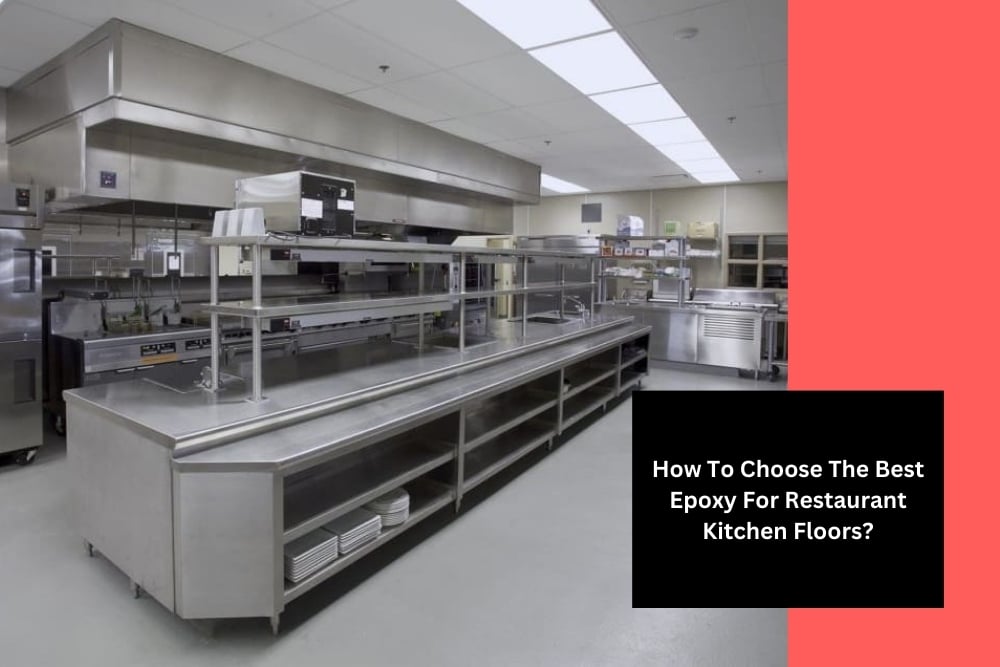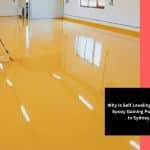Running a restaurant is a demanding job, and your kitchen floor takes the brunt of the action. Constant foot traffic, spills, grease, and temperature fluctuations put immense pressure on your flooring. That’s why choosing the right material is crucial for both safety and longevity. Enter epoxy floor for restaurant kitchen – a durable, versatile, and easy-to-maintain solution that can transform your culinary haven.
But with different types of epoxy available, navigating the options can be overwhelming. Fear not! This guide will equip you with the knowledge to choose the best epoxy floor for your restaurant kitchen.
What are the challenges of restaurant kitchen floors?
Imagine a battlefield: hot pans sizzle, plates clatter, and staff navigate a constant dance around spills and grease. That’s the reality of a restaurant kitchen floor. Here’s what it needs to withstand:
- High traffic and wear: From waitstaff to deliveries, your floor endures continuous foot traffic, requiring exceptional durability to resist scuffs and cracks.
- Spills and grease buildup: From cooking oils to dropped sauces, greasy messes are inevitable. You need a floor that’s easy to clean and won’t harbour harmful bacteria.
- Chemical resistance: Cleaning chemicals, acidic spills, and even hot liquids – your floor should be able to handle them without deteriorating.
- Slip and fall prevention: A wet kitchen floor is a recipe for disaster. Slip-resistant epoxy ensures the safety of your staff and customers.
Is epoxy flooring right for your restaurant kitchen?

Choosing the right flooring for your restaurant kitchen is a crucial decision. While epoxy offers undeniable benefits, it’s essential to weigh the pros and cons before making a commitment.
Pros:
- Durability and longevity: With proper care, an epoxy floor can last for years, saving you money on frequent replacements.
- Easy to clean and maintain: The seamless surface makes cleaning a breeze, reducing labour costs and promoting hygiene.
- Slip resistance: Choose the right finish to ensure the safety of your staff and customers.
- Chemical resistance: Handles cleaning chemicals and spills with ease, ideal for maintaining a hygienic environment.
- Customisation: Wide range of colours and finishes to match your brand and create a desired aesthetic.
Cons:
- Initial cost: Epoxy flooring can be more expensive than some other options upfront.
- Installation complexity: Requires professional installation, adding to the overall cost.
- Cold and hard surface: This may not be the most comfortable for standing for long periods.
- Potential for cracks and chips: Though durable, damage can occur if not properly maintained.
How do you choose the right type of epoxy for your restaurant kitchen?
Now, onto the exciting part – selecting the perfect epoxy warrior for your kitchen. Here’s what to consider:
- Budget: Different epoxy types vary in price. Self-levelling epoxy offers smooth finishes but might be more expensive, while quartz-filled options provide excellent durability at a lower cost.
- Traffic volume: Consider the intensity of foot traffic. High-traffic kitchens benefit from thicker, high-build epoxy for enhanced wear resistance.
- Chemical resistance needs: If you deal with harsh chemicals or acidic ingredients, choose an epoxy specifically formulated for such exposure.
- Slip resistance: Prioritise slip-resistant finishes, especially in areas prone to spills and water. Textured finishes or anti-slip additives offer added peace of mind.
For a truly unique and personalised look, explore the possibilities of coloured and patterned epoxy floors in our blog ‘Can You Personalise Epoxy Floors With Colours and Patterns?‘
What are the key factors to consider when choosing an epoxy floor installer?
Installing an epoxy floor requires expertise. Here’s how to find the right installer:
- Experience: Look for companies with proven experience in restaurant kitchens. They understand the unique challenges and can recommend the best solutions.
- Product knowledge: Choose an installer who is knowledgeable about different epoxy types and their suitability for your needs.
- Certifications and insurance: Ensure they have the necessary certifications and insurance for your peace of mind.
- Warranty and guarantee: Ask about the warranty offered and any guarantees they provide on their workmanship and materials.
How much does an epoxy floor cost for a restaurant kitchen?
Epoxy floors offer excellent value for money, but understanding the cost factors is crucial:
- Square footage: This obviously impacts the overall cost. Measure your kitchen accurately to get precise estimates.
- Type of epoxy: Different types have varying costs. Consider your budget and choose the option that best fits your needs.
- Installation complexity: Factors like floor preparation, desired finish, and cove base installation can influence the cost.
Remember, the best approach is to get quotes from several reputable installers to compare prices and services.
How do you care for and maintain your epoxy floor for restaurant kitchens?
Just like any warrior, your epoxy floor needs proper care to stay in top shape:
- Cleaning: Treat your floor with gentle cleaning products specifically formulated for epoxy. Harsh chemicals are like enemy swords, dulling the surface and weakening its defences. Opt for neutral pH cleaners that remove dirt and grime without compromising the integrity of the material, ensuring a hygienic environment as mandated by food standards.
- Preventative Maintenance: Be proactive! Regularly mop up spills, especially those of grease and acidic liquids, which can leave unsightly stains and potentially weaken the floor. Think of it as tending to minor wounds before they fester.
- Spotting Wear and Tear: Keep a watchful eye on any signs of damage, like cracks, chips, or dullness. These are like warning flags, indicating potential vulnerabilities. Address minor issues promptly before they escalate. For small cracks, consider using a specialized epoxy repair kit – like a warrior patching his armour. Larger cracks or chips might require the expertise of a professional, akin to seeking a skilled healer for more serious injuries.
- Maintaining Shine: Over time, even the most valiant warrior’s armour can lose its lustre. Combat dullness with regular buffing using a soft-bristled floor buffer and an epoxy-specific polish. This restores shine and removes minor scratches, keeping your floor looking its best. Deep cleaning with a professional-grade epoxy floor cleaner might be necessary for stubborn grime, but remember, harsh chemicals are your enemy!
Making the final decision
Ultimately, the best flooring choice for your restaurant kitchen depends on your specific needs and budget. Consider factors like traffic volume, chemical exposure, desired aesthetics, and maintenance requirements. If durability, ease of cleaning, and safety are top priorities, epoxy flooring is a strong contender.
At Ultimate Epoxy Flooring, we specialise in creating high-performance, beautiful epoxy floors for restaurants. We understand the unique demands of your kitchen environment and can recommend the perfect solution for your needs. Our team of experienced professionals utilises the latest techniques and top-quality materials to ensure a flawless and long-lasting installation. Contact us today for a free consultation.
Remember, investing in the right flooring is an investment in your restaurant’s success. Let us help you create a kitchen floor that’s both functional and stunning.







